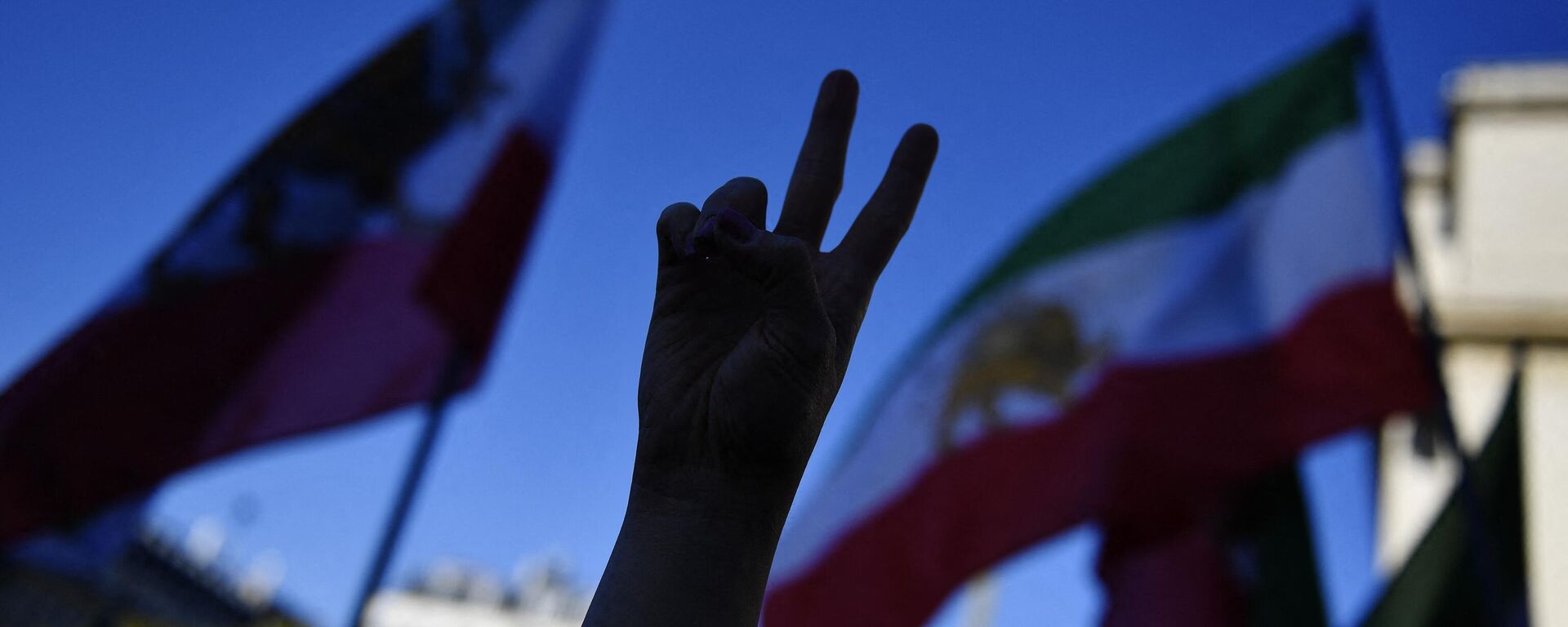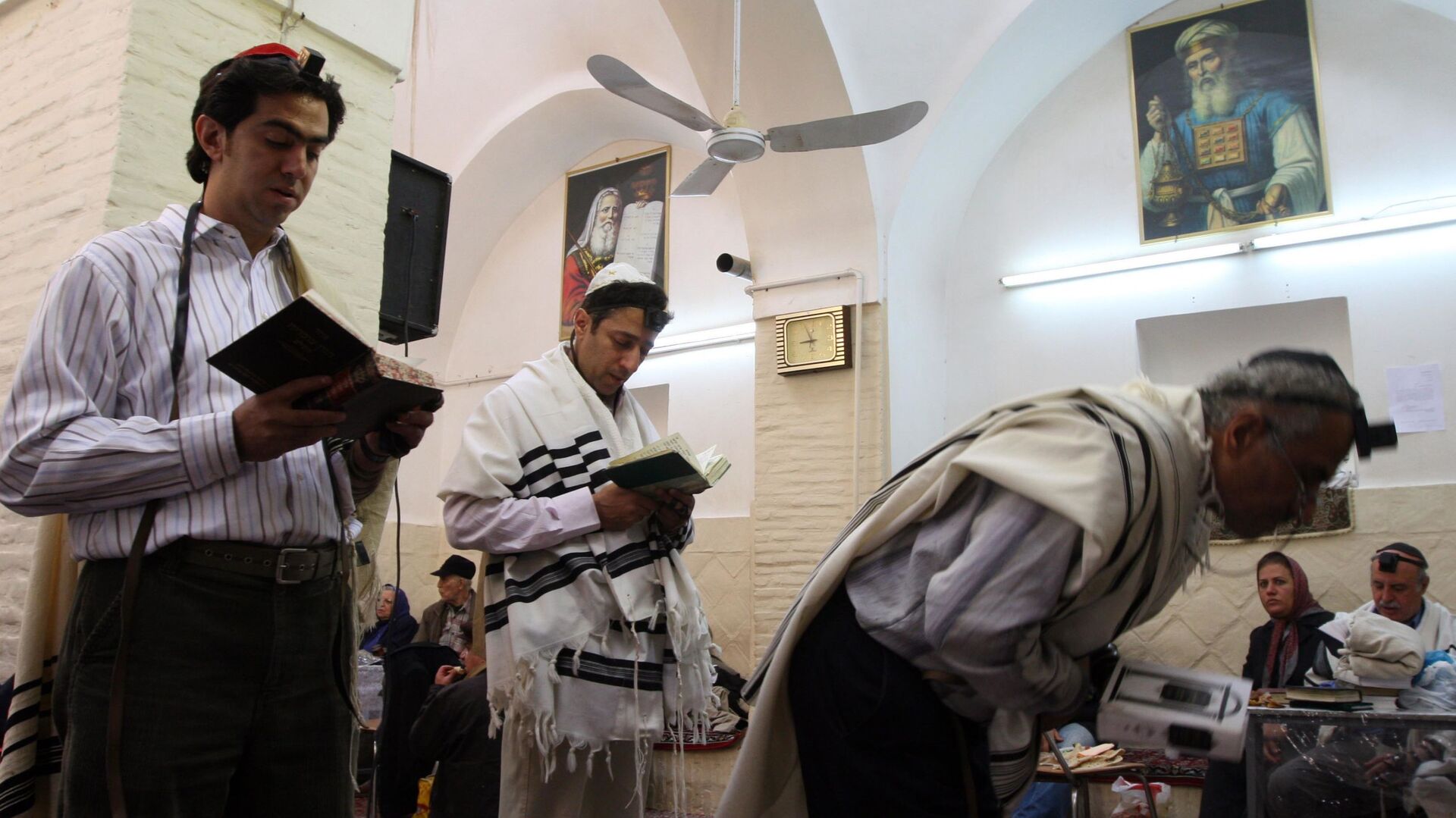https://sputnikglobe.com/20221126/irans-jews-condemn-anti-government-protests-1104734585.html
Iran’s Jews Condemn Anti-Government Protests
Iran’s Jews Condemn Anti-Government Protests
Sputnik International
Despite its back-and-forth exchanges of acrimony with its arch-enemy, Israel, the Islamic Republic of Iran is also home to the second-largest community of Jews... 26.11.2022, Sputnik International
2022-11-26T15:34+0000
2022-11-26T15:34+0000
2022-11-26T15:37+0000
world
iran
jewish
riots
unrest
https://cdn1.img.sputnikglobe.com/img/07e5/05/08/1082833115_0:177:3012:1871_1920x0_80_0_0_a0b37b9d2bd2fb1ad76efc0fe9de4e36.jpg
The Tehran Central Jewish Committee – an umbrella group representing Iran’s Jewish organizations, has issued a statement condemning recent anti-government violence and unrest and expressing its support for the government.“The Tehran Central Jewish Committee condemns the recent unrest in the country, which has resulted in the death and injury of several of our compatriots, as well as large financial losses to the nation. We declare that the Jewish community of Iran has always followed and obeyed the position of the Supreme Leader, like our fellow countrymen, and has been on the front lines in confronting those who disrupt order and security,” the TCJC said in a letter published this week.The TCJC is responsible for the care and upkeep of a number of Jewish-run institutions in Iran, including more than two dozen synagogues, the Dr. Sapir Hospital and Charity Center in Tehran, a Jewish cemetery, a bakery and kosher slaughterhouse which operate in accordance to Jewish customs, as well as Jewish schools and sports centers. The organization also operates a special Jewish legal authority which rules on civil matters.The TCJC’s appeal comes amid a tense security situation in the country in connection to large-scale protests and riots in some cities following the death of Mahsa Amini, a 22-year-old woman from Tehran who died in hospital several days after being detained by the morality police for improperly wearing her hijab. Protests began on September 15 in the Iranian capital, and quickly spread to other regions amid claims by demonstrators that Amini died injuries after being viciously beaten in police custody. However, CCTV footage of her detention showed that she appeared to have passed out and suffered a heart attack after arguing with a minder, and was not subjected to any form of physical mistreatment.Iran's authorities have roundly condemned the violence resulting from the protests, which has caused scores of deaths and injuries, including among both protesters and security forces, and have accused Western countries and Israel of fueling unrest both on the ground and online.The protests and riots put Iran’s Jewish community on edge, with the TCJC asking members to avoid synagogues in September, and calling on the religious centers to close daily at 5 pm in light of the “current circumstances.”Iran’s Jewish community is one of the oldest in the world, with roots going back to the 6th century BC. Today, Iran is home to the largest community of Jews in the Middle East outside Israel, with its estimated 10,000 members enjoying religious protections, a reserved seat in parliament, and the right to Sabbath wine in a country which otherwise has strict prohibitions on the production and consumption of alcohol. Before the Iranian Revolution of 1979, the country was home to over 100,000 Jews, with many fleeing the country, sometimes only to suffer discrimination in their new homes.Iran's Jewish leaders have consistently condemned Israel, Iran’s regional nemesis, calling the ideology of Zionism a late-19th century construct, and characterizing the decades-old conflict between Israel and Iran “a debate between politicians” that “has nothing to do with religion.”Iran’s Jews aren’t the only minority to condemn the protests and side with authorities. Mamousta Fayeq-Rostami, the country’s top Sunni cleric, has slammed the riots last week, saying that freedom and democracy under Islam do not mean “anarchy” and the destruction of property. “Children should not be orphaned in the name of protest. The enemy seeks to create insecurity in our society and will hatch any conspiracy to achieve this goal…Religious scholars and authorities should invite the people toward peace through their tact and logic, and they should provide the basis for solving problems by creating a discourse,” the cleric urged, speaking in the Kurdish-majority city of Sanandaj, western Iran.
https://sputnikglobe.com/20221125/over-40-foreign-nationals-detained-amid-ongoing-anti-government-protests-in-iran-1104706579.html
iran
Sputnik International
feedback@sputniknews.com
+74956456601
MIA „Rossiya Segodnya“
2022
News
en_EN
Sputnik International
feedback@sputniknews.com
+74956456601
MIA „Rossiya Segodnya“
Sputnik International
feedback@sputniknews.com
+74956456601
MIA „Rossiya Segodnya“
iran, iranian jews, protest, violence, unrest, condemnation
iran, iranian jews, protest, violence, unrest, condemnation
Iran’s Jews Condemn Anti-Government Protests
15:34 GMT 26.11.2022 (Updated: 15:37 GMT 26.11.2022) Despite its back-and-forth exchanges of acrimony with its arch-enemy, Israel, the Islamic Republic of Iran is also home to the second-largest community of Jews in the Middle East. The minority has shown steadfast loyalty to the state over the decades, and in turn has received a number of cultural and religious preferences from authorities.
The Tehran Central Jewish Committee – an umbrella group representing Iran’s Jewish organizations, has issued a statement condemning recent anti-government violence and unrest and expressing its support for the government.
“The Tehran Central Jewish Committee condemns the recent unrest in the country, which has resulted in the death and injury of several of our compatriots, as well as large financial losses to the nation. We declare that the Jewish community of Iran has always followed and obeyed the position of the Supreme Leader, like our fellow countrymen, and has been on the front lines in confronting those who disrupt order and security,” the TCJC said in a
letter published this week.
The umbrella group condemned the “unfortunate events and incidents” which have rocked the country over the past two months, and called on all Iranians “to avoid the polarization of the nation, and to discuss certain shortcomings in a calm atmosphere to open the space for dialogue.” Such an outcome would be “in everyone’s favor,” according to the group.
The TCJC is responsible for the care and upkeep of a number of Jewish-run institutions in Iran, including more than two dozen synagogues, the Dr. Sapir Hospital and Charity Center in Tehran, a Jewish cemetery, a bakery and kosher slaughterhouse which operate in accordance to Jewish customs, as well as Jewish schools and sports centers. The organization also operates a special Jewish legal authority which rules on civil matters.
The TCJC’s appeal comes amid a tense security situation in the country in connection to large-scale protests and riots in some cities following the death of Mahsa Amini, a 22-year-old woman from Tehran who died in hospital several days after being detained by the morality police for improperly wearing her hijab. Protests began on September 15 in the Iranian capital, and quickly spread to other regions amid claims by demonstrators that Amini died injuries after being viciously beaten in police custody. However, CCTV footage of her detention showed that she appeared to have passed out and suffered a heart attack after arguing with a minder, and was not subjected to any form of physical mistreatment.
Iran's authorities have roundly condemned the violence resulting from the protests, which has caused scores of deaths and injuries, including among both protesters and security forces, and
have accused Western countries and Israel of fueling unrest both on the ground and online.

25 November 2022, 19:34 GMT
The protests and riots put Iran’s Jewish community on edge, with the TCJC asking members to avoid synagogues in September, and calling on the religious centers to close daily at 5 pm in light of the “current circumstances.”
Iran’s Jewish community is one of the oldest in the world, with roots going back to the 6th century BC. Today, Iran is home to the largest community of Jews in the Middle East outside Israel, with its estimated 10,000 members enjoying religious protections, a reserved seat in parliament, and the right to Sabbath wine in a country which otherwise has strict prohibitions on the production and consumption of alcohol. Before the Iranian Revolution of 1979, the country was home to over 100,000 Jews, with many fleeing the country, sometimes
only to suffer discrimination in their new homes.
Iran's Jewish leaders have consistently condemned Israel, Iran’s regional nemesis,
calling the ideology of Zionism a late-19th century construct, and
characterizing the decades-old conflict between Israel and Iran “a debate between politicians” that “has nothing to do with religion.”
Iran’s Jews aren’t the only minority to condemn the protests and side with authorities. Mamousta Fayeq-Rostami, the country’s top Sunni cleric, has slammed the riots last week, saying that freedom and democracy under Islam do not mean “anarchy” and the destruction of property. “Children should not be orphaned in the name of protest. The enemy seeks to create insecurity in our society and will hatch any conspiracy to achieve this goal…Religious scholars and authorities should invite the people toward peace through their tact and logic, and they should provide the basis for solving problems by creating a discourse,” the cleric
urged, speaking in the Kurdish-majority city of Sanandaj, western Iran.



